倒装常用句型
- 格式:doc
- 大小:34.50 KB
- 文档页数:5
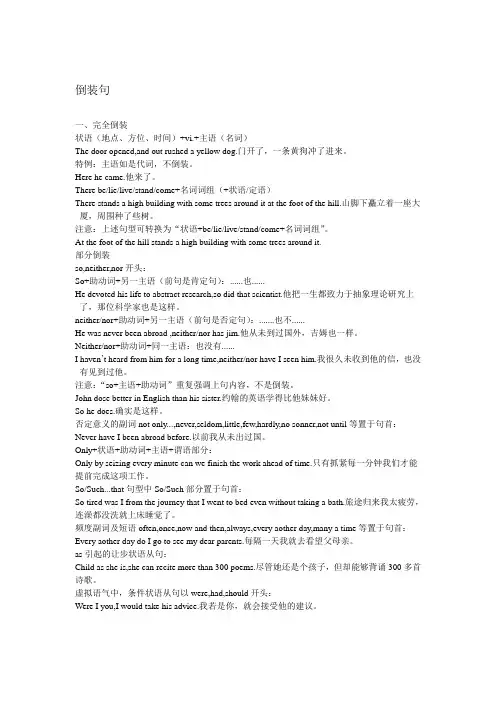
倒装句一、完全倒装状语(地点、方位、时间)+vi.+主语(名词)The door opened,and out rushed a yellow dog.门开了,一条黄狗冲了进来。
特例:主语如是代词,不倒装。
Here he came.他来了。
There be/lie/live/stand/come+名词词组(+状语/定语)There stands a high building with some trees around it at the foot of the hill.山脚下矗立着一座大厦,周围种了些树。
注意:上述句型可转换为“状语+be/lie/live/stand/come+名词词组”。
At the foot of the hill stands a high building with some trees around it.部分倒装so,neither,nor开头:So+助动词+另一主语(前句是肯定句):......也......He devoted his life to abstract research,so did that scientist.他把一生都致力于抽象理论研究上了,那位科学家也是这样。
neither/nor+助动词+另一主语(前句是否定句):.......也不......He was never been abroad ,neither/nor has jim.他从未到过国外,吉姆也一样。
Neither/nor+助动词+同一主语:也没有......I haven’t heard from him for a long time,neither/nor have I seen him.我很久未收到他的信,也没有见到过他。
注意:“so+主语+助动词”重复强调上句内容,不是倒装。
John dose better in English than his sister.约翰的英语学得比他妹妹好。
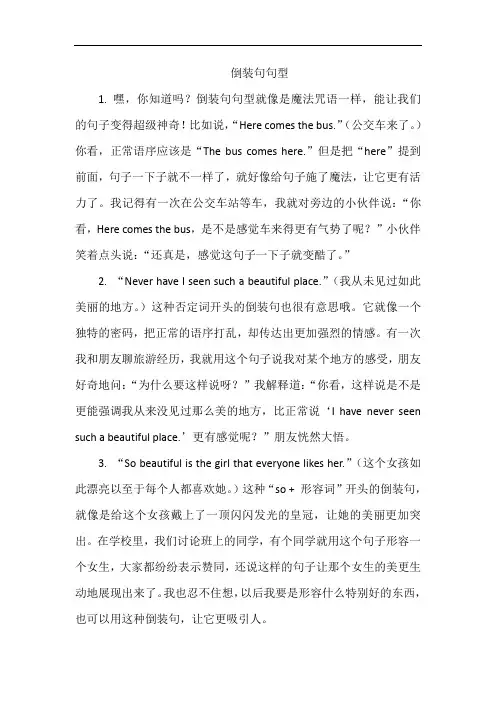
倒装句句型1. 嘿,你知道吗?倒装句句型就像是魔法咒语一样,能让我们的句子变得超级神奇!比如说,“Here comes the bus.”(公交车来了。
)你看,正常语序应该是“The bus comes here.”但是把“here”提到前面,句子一下子就不一样了,就好像给句子施了魔法,让它更有活力了。
我记得有一次在公交车站等车,我就对旁边的小伙伴说:“你看,Here comes the bus,是不是感觉车来得更有气势了呢?”小伙伴笑着点头说:“还真是,感觉这句子一下子就变酷了。
”2. “Never have I seen such a beautiful place.”(我从未见过如此美丽的地方。
)这种否定词开头的倒装句也很有意思哦。
它就像一个独特的密码,把正常的语序打乱,却传达出更加强烈的情感。
有一次我和朋友聊旅游经历,我就用这个句子说我对某个地方的感受,朋友好奇地问:“为什么要这样说呀?”我解释道:“你看,这样说是不是更能强调我从来没见过那么美的地方,比正常说‘I have never seen such a beautiful place.’更有感觉呢?”朋友恍然大悟。
3. “So beautiful is the girl that everyone likes her.”(这个女孩如此漂亮以至于每个人都喜欢她。
)这种“so + 形容词”开头的倒装句,就像是给这个女孩戴上了一顶闪闪发光的皇冠,让她的美丽更加突出。
在学校里,我们讨论班上的同学,有个同学就用这个句子形容一个女生,大家都纷纷表示赞同,还说这样的句子让那个女生的美更生动地展现出来了。
我也忍不住想,以后我要是形容什么特别好的东西,也可以用这种倒装句,让它更吸引人。
4. “Only in this way can we solve the problem.”(只有通过这种方式我们才能解决问题。
)“only + 状语”开头的倒装句就像一把钥匙,能打开解决问题的大门。
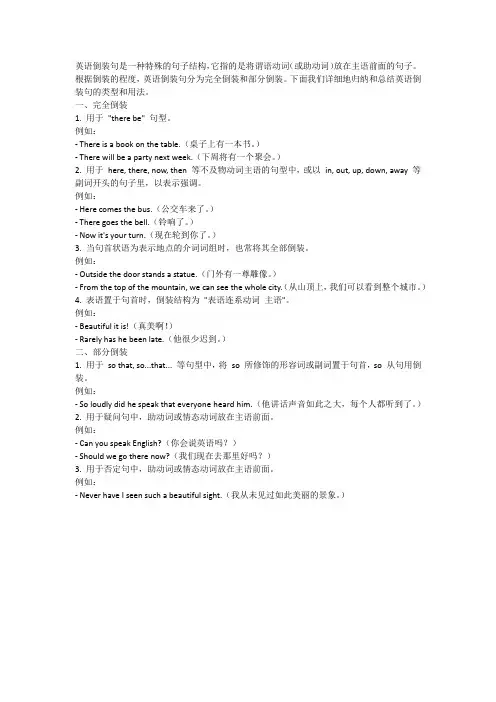
英语倒装句是一种特殊的句子结构,它指的是将谓语动词(或助动词)放在主语前面的句子。
根据倒装的程度,英语倒装句分为完全倒装和部分倒装。
下面我们详细地归纳和总结英语倒装句的类型和用法。
一、完全倒装1. 用于"there be" 句型。
例如:- There is a book on the table.(桌子上有一本书。
)- There will be a party next week.(下周将有一个聚会。
)2. 用于here, there, now, then 等不及物动词主语的句型中,或以in, out, up, down, away 等副词开头的句子里,以表示强调。
例如:- Here comes the bus.(公交车来了。
)- There goes the bell.(铃响了。
)- Now it's your turn.(现在轮到你了。
)3. 当句首状语为表示地点的介词词组时,也常将其全部倒装。
例如:- Outside the door stands a statue.(门外有一尊雕像。
)- From the top of the mountain, we can see the whole city.(从山顶上,我们可以看到整个城市。
)4. 表语置于句首时,倒装结构为"表语连系动词主语"。
例如:- Beautiful it is!(真美啊!)- Rarely has he been late.(他很少迟到。
)二、部分倒装1. 用于so that, so...that... 等句型中,将so 所修饰的形容词或副词置于句首,so 从句用倒装。
例如:- So loudly did he speak that everyone heard him.(他讲话声音如此之大,每个人都听到了。
)2. 用于疑问句中,助动词或情态动词放在主语前面。
例如:- Can you speak English?(你会说英语吗?)- Should we go there now?(我们现在去那里好吗?)3. 用于否定句中,助动词或情态动词放在主语前面。
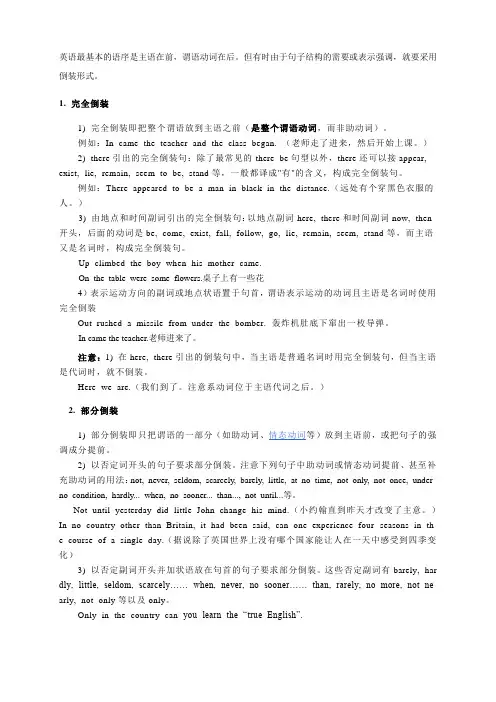
英语最基本的语序是主语在前,谓语动词在后。
但有时由于句子结构的需要或表示强调,就要采用倒装形式。
1. 完全倒装1) 完全倒装即把整个谓语放到主语之前(是整个谓语动词,而非助动词)。
例如:In came the teacher and the class began. (老师走了进来,然后开始上课。
)2) there引出的完全倒装句:除了最常见的there be句型以外,there还可以接appear, exist, lie, remain, seem to be, stand等,一般都译成"有"的含义,构成完全倒装句。
例如:There appeared to be a man in black in the distance.(远处有个穿黑色衣服的人。
)3) 由地点和时间副词引出的完全倒装句:以地点副词here, there和时间副词now, then 开头,后面的动词是be, come, exist, fall, follow, go, lie, remain, seem, stand等,而主语又是名词时,构成完全倒装句。
Up climbed the boy when his mother came.On the table were some flowers.桌子上有一些花4)表示运动方向的副词或地点状语置于句首,谓语表示运动的动词且主语是名词时使用完全倒装Out rushed a missile from under the bomber. 轰炸机肚底下窜出一枚导弹。
In came the teacher.老师进来了。
注意:1) 在here, there引出的倒装句中,当主语是普通名词时用完全倒装句,但当主语是代词时,就不倒装。
Here we are.(我们到了。
注意系动词位于主语代词之后。
)2. 部分倒装1) 部分倒装即只把谓语的一部分(如助动词、情态动词等)放到主语前,或把句子的强调成分提前。
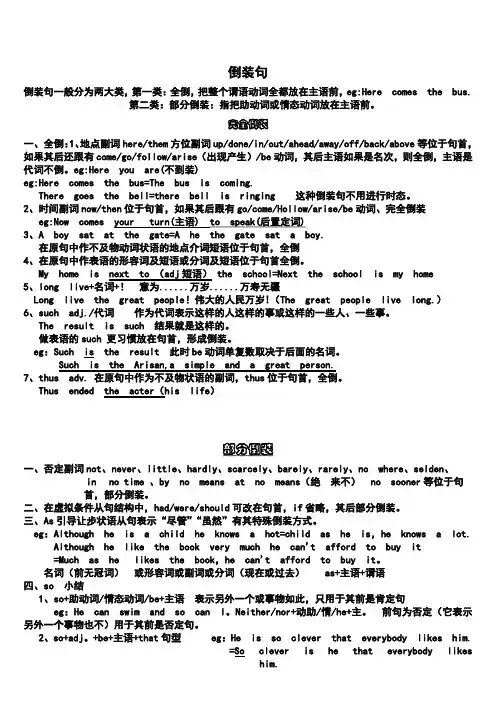
倒装句倒装句一般分为两大类,第一类:全倒,把整个谓语动词全都放在主语前,eg:Here comes the bus.第二类:部分倒装:指把助动词或情态动词放在主语前。
完全倒装一、全倒:1、地点副词here/them方位副词up/done/in/out/ahead/away/off/back/above等位于句首,如果其后还跟有come/go/follow/arise(出现产生)/be动词,其后主语如果是名次,则全倒,主语是代词不倒。
eg:Here you are(不到装)eg:Here comes the bus=The bus is coming.There goes the bell=there bell is ringing 这种倒装句不用进行时态。
2、时间副词now/then位于句首,如果其后跟有go/come/Hollow/arise/be动词、完全倒装eg:Now comes your turn(主语) to speak(后置定词)3、A boy sat at the gate=A he the gate sat a boy.在原句中作不及物动词状语的地点介词短语位于句首,全倒4、在原句中作表语的形容词及短语或分词及短语位于句首全倒。
My home is next to (adj短语) the school=Next the school is my home5、long live+名词+!意为......万岁......万寿无疆Long live the great people!伟大的人民万岁!(The great people live long.)6、such adj./代词作为代词表示这样的人这样的事或这样的一些人、一些事。
The result is such 结果就是这样的。
做表语的such 更习惯放在句首,形成倒装。
eg:Such is the result 此时be动词单复数取决于后面的名词。
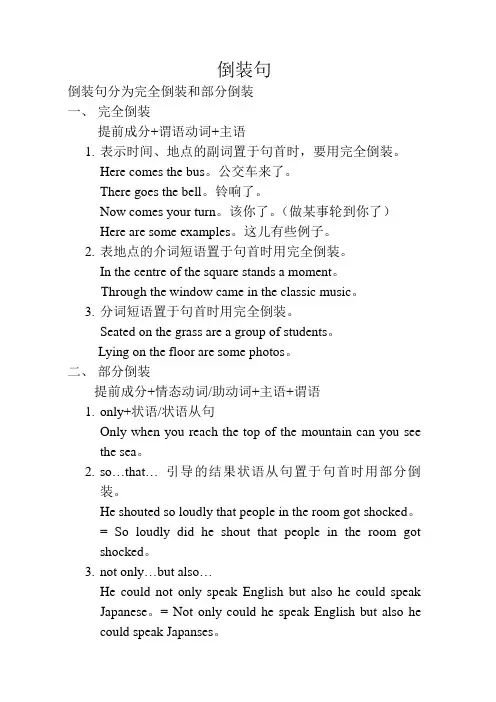
倒装句倒装句分为完全倒装和部分倒装一、完全倒装提前成分+谓语动词+主语1.表示时间、地点的副词置于句首时,要用完全倒装。
Here comes the bus。
公交车来了。
There goes the bell。
铃响了。
Now comes your turn。
该你了。
(做某事轮到你了)Here are some examples。
这儿有些例子。
2.表地点的介词短语置于句首时用完全倒装。
In the centre of the square stands a moment。
Through the window came in the classic music。
3.分词短语置于句首时用完全倒装。
Seated on the grass are a group of students。
Lying on the floor are some photos。
二、部分倒装提前成分+情态动词/助动词+主语+谓语1.only+状语/状语从句Only when you reach the top of the mountain can you see the sea。
2.so…that…引导的结果状语从句置于句首时用部分倒装。
He shouted so loudly that people in the room got shocked。
= So loudly did he shout that people in the room got shocked。
3.not only…but also…He could not only speak English but also he could speak Japanese。
= Not only could he speak English but also he could speak Japanses。
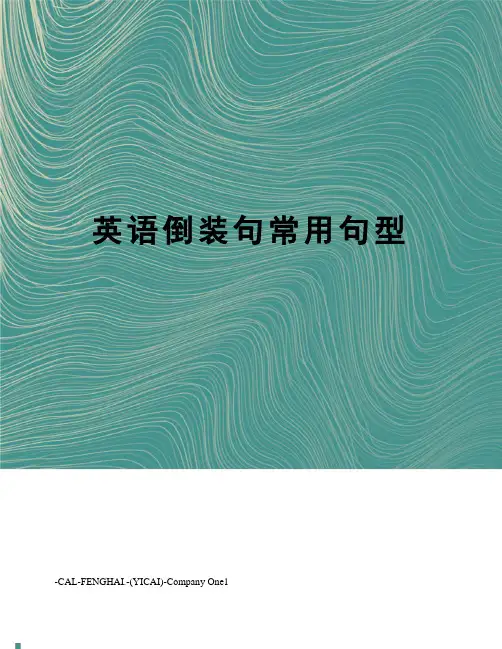
英语倒装句常用句型-CAL-FENGHAI.-(YICAI)-Company One1英语倒装句常用句型1. 否定副词位于句首时的倒装在正式文体中,never, seldom, rarely, little, hardly, scarcely, no sooner, no longer, nowhere 等含有否定意义的副词若位于句首,则其后要用部分倒装:He seldom goes out for dinner. / Seldom does he go out for dinner.2. “only+状语”位于句首时的倒装当一个状语受副词only的修饰且置于句首时,其后用部分倒装语序:Only then did he realize that he was wrong.3. “绝不”:某些起副词作用的介词短语,由于含有否定词,若位于句首,其后要用部分倒装:by no means/on no occasion/ not in the least;/ in no circumstances;On no accounts must this switch be touched.这个开关是绝不能触摸的。
In [Under] no circumstances will I lend money to him.无论如何我也不会再借钱给他了。
4.固定搭配:(1) 对于not…until句型,当not until…位于句首时,其后的主句要用倒装语序:He didn’t leave the room until the rain stopped. /Not until the rain stopped did he leave the room. 雨停了之后他才离开这房间。
(2) “前倒后不倒型”①由not only…but also引出的倒装当not only…but also位于句首引出句子时,not only 后的句子通常用部分倒装:Not only did he refuse the gift, he also severely criticized the sender.②表示“刚……就……的倒装结构no sooner…than, hardly… when,scarcely… whenHardly had he started to leave when it began to rain.他刚要离开,天就下起了雨。
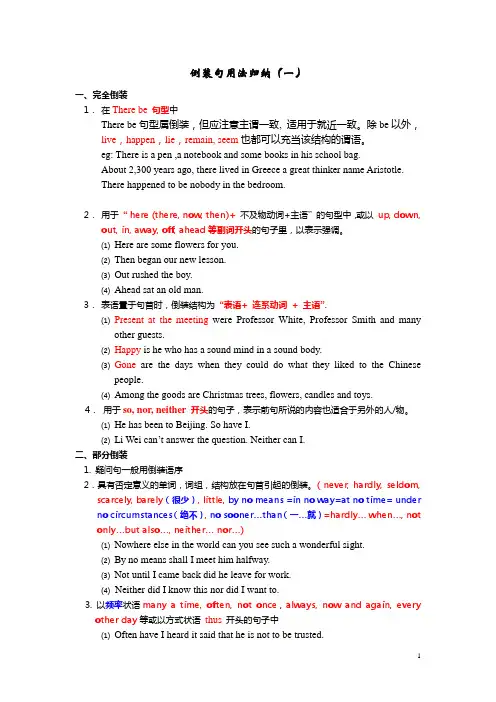
倒装句用法归纳(一)一、完全倒装1.在There be句型中There be句型属倒装,但应注意主谓一致, 适用于就近一致。
除be以外,live,happen,lie,remain, seem也都可以充当该结构的谓语。
eg: There is a pen ,a notebook and some books in his school bag.About 2,300 years ago, there lived in Greece a great thinker name Aristotle.There happened to be nobody in the bedroom.2.用于“ here (there, now, then)+不及物动词+主语”的句型中,或以up, down, out, in, away, off, ahead等副词开头的句子里,以表示强调。
⑴Here are some flowers for you.⑵Then began our new lesson.⑶Out rushed the boy.⑷Ahead sat an old man.3.表语置于句首时,倒装结构为“表语+ 连系动词 + 主语”.⑴Present at the meeting were Professor White, Professor Smith and manyother guests.⑵Happy is he who has a sound mind in a sound body.⑶Gone are the days when they could do what they liked to the Chinesepeople.⑷Among the goods are Christmas trees, flowers, candles and toys.4.用于so, nor, neither开头的句子,表示前句所说的内容也适合于另外的人/物。
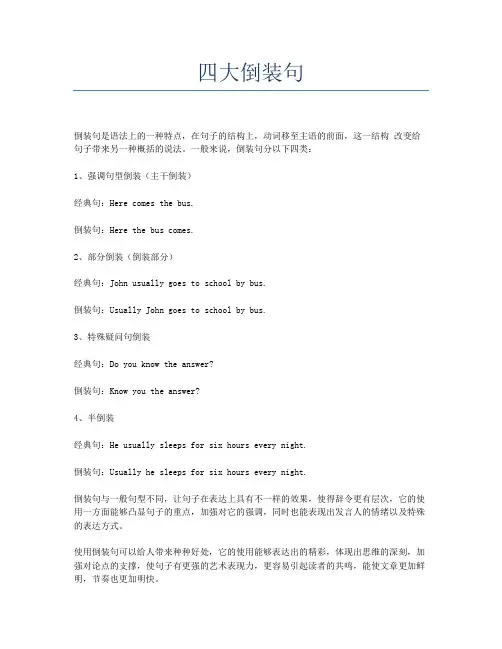
四大倒装句倒装句是语法上的一种特点,在句子的结构上,动词移至主语的前面,这一结构改变给句子带来另一种概括的说法。
一般来说,倒装句分以下四类:1、强调句型倒装(主干倒装)经典句:Here comes the bus.倒装句:Here the bus comes.2、部分倒装(倒装部分)经典句:John usually goes to school by bus.倒装句:Usually John goes to school by bus.3、特殊疑问句倒装经典句:Do you know the answer?倒装句:Know you the answer?4、半倒装经典句:He usually sleeps for six hours every night.倒装句:Usually he sleeps for six hours every night.倒装句与一般句型不同,让句子在表达上具有不一样的效果,使得辞令更有层次,它的使用一方面能够凸显句子的重点,加强对它的强调,同时也能表现出发言人的情绪以及特殊的表达方式。
使用倒装句可以给人带来种种好处,它的使用能够表达出的精彩,体现出思维的深刻,加强对论点的支撑,使句子有更强的艺术表现力,更容易引起读者的共鸣,能使文章更加鲜明,节奏也更加明快。
但倒装句使用时,需要特别注意这几点:首先,掌握正确的倒装方式,如部分倒装形式中只能倒装谓语动词的非第一个动词;其次,不能频繁使用(有的人因为喜欢使用而被误解为在投机取巧,而影响到句子的逻辑性,而且使句子不易理解);最后,要学会结合实际使用,使得倒装句更富有艺术性,触达读者心弦。
总而言之,倒装句是一种复杂的语法知识,掌握倒装句的使用方法及注意事项,可以给文字表达带来更多的丰富和新颖,也能帮助我们更好的驾驭文字表达。
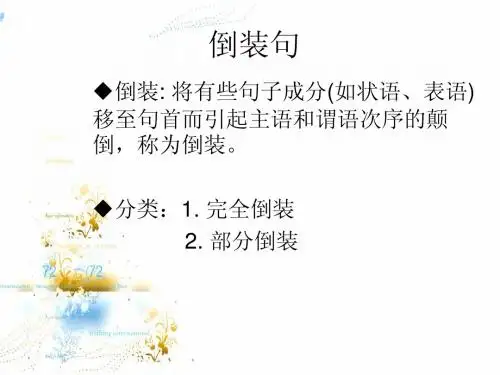

英语中常见的12种倒装结构-CAL-FENGHAI.-(YICAI)-Company One1英语中常见的12种倒装结构(1)多数疑问句都是倒装语序.例:Is this raincoat yours这件雨衣是你的吗(2) there be 句型及其变体therelive(stand,lie,appear,seem,remain,exist…..等) 中,按语法需要,谓语动词全部位于主语之前,成为倒装语序。
例:there is no longer a particular year in which one goes to work or gets married or starts a family.(美国)不再有一个特定的上学、工作、结婚或成家的年龄。
(3)省去if的虚拟条件从句要采用倒装语序。
例:Were it rain tomorrow , we would have to put off the visit to the Yangpu Bridge.如果明天下雨的话,我们只好推迟参观杨浦大桥。
(4)以so,neither,nor引起的表示和前面句子意思相同的句子用倒装语序。
例:he has been to Beijing.so have I.他去过北京。
我也去过北京。
(5)以here(或there,now,then等)开头且谓语动词是be(或com,go等)句子采用倒装语序。
例:Here are some advertisements about English language training from newspapers.这儿有几则选自报纸的关于英语语言培训的广告。
(6)as引导的让步状语从句用倒装语句。
例:clever as he is,he doesn’t study well.尽管他很聪明却不好好学习。
(7)直接引语前置,名词作引述句主语时用倒装语序。
例:“It is unbelievable!”said a from Guangdong province.一位来自广东的教师说:“这真叫人难以置信”(8) 某些表示愿望的感叹句要用倒装语序。
倒装句的种类及常见句型倒装句是英语中常见的一种语法结构,它与普通的句式结构不同,通常会将主语和谓语的顺序颠倒。
倒装句在表达强调、对比、条件等意义时具有独特的作用,同时也是考试和日常写作中需要掌握的重要语法知识。
本文将介绍倒装句的种类及常见句型。
一、完全倒装句完全倒装句在句子中把整个谓语都移至主语之前,常见的结构有以下几种:1. 在助动词或情态动词之前倒装:Never had I seen such a beautiful sunset before.(我以前从未见过如此美丽的日落。
)Not only does she speak English fluently, but she also speaks French.(她不仅英语讲得流利,而且还会说法语。
)2. 在表示方位、地点或副词(adverbs of place)之前倒装:Out rushed the students as soon as the bell rang.(铃一响,学生们都冲了出去。
)Here comes the bus.(车来了。
)3. 在表示条件和让步的状语从句之前倒装:Should you have any questions, please feel free to ask.(如果你有任何问题,请随时提问。
)However hard he worked, he couldn't pass the exam.(无论他多努力,他都无法通过考试。
)二、部分倒装句部分倒装句是指将谓语的一部分与主语颠倒,常见的结构有以下几种:1. 在否定副词或短语之前倒装:Not until midnight did the party finally come to an end.(直到午夜,聚会才最终结束。
)At no time did she mention his name.(她从不提他的名字。
)2. 在连词so、neither、nor等之后倒装:They were tired, and so were we.(他们累了,我们也是。
文言文中常见的四种倒装句式包括:主谓倒装、状语倒装、宾语倒装和动补倒装。
以下是每种倒装句式及例句:
1. 主谓倒装:
a. 谓语提前,主语后置。
b. 例句:飞花逐水容易别,落絮无情不觉春。
2. 状语倒装:
a. 状语或状语从句位于句首,谓语紧随其后。
b. 例句:春风得意马蹄疾,一日看尽长安花。
3. 宾语倒装:
a. 宾语位于句首,谓语紧随其后。
b. 例句:云想衣裳花想容,春风拂槛露华浓。
4. 动补倒装:
a. 动词+补语的结构中,补语位于句首,动词紧随其后。
b. 例句:不见此花人自寻,只闻寒雁叫西风。
这些例句中展示了不同的倒装句式,在文言文中常用于修辞或突出特定的表达方式。
请注意,这里的例句仅供参考,实际应用时可能根据语境和内容的需要进行变化。
1.在there be/live/lie句型中用全部倒装:e.g.: There are some books on the desk.There lived an emperor many years ago.2.在以there, here, now, then +be/come/go+主语的句子中用全部倒装:e.g.:Now comes your turn.There goes the bell.注:如果主语是代词则不用倒装。
Here you are. Here he comes.3.以off, away, out, in, up, down等副词开头的句子以示强调或为了使情景更生动,句子用全部倒装:e.g.:Away went the children.Out rushed the boy.注:如果主语是人称代词则不用倒装。
4. only, not until所修饰的介词短语、副词或状语从句放在句首时,要部分倒装:e.g.: Only then did I realize that I was wrong.Only in this way can you solve the problem.注:①主句倒装,从句不倒装。
Not until the father came did he go back to school.Only when the war was over in 1949 was he able to get back home.②Only+主语置于句首时,不倒装。
Only Wang Li knows this.5. never, hardly, seldom, scarcely, barely, not, few, little, often, by no means, at no time等放在句首时,要部分倒装:e.g.:Often did we warn them not to do it.Little did I know who the boy was.Not a single word have I written down.6.在no sooner…than; not only…but also; hardly/scarcely …when; 句型中,前面的句子要部分倒装:e.g.:No sooner had I reached the station than the train left. =Hardly had I reached the station when the train left.Not only does he like English but also he learns it well.注:not only…but also, neither…nor连接两个主语不倒装。
倒装句(主倒,从不倒)(一)全倒装:1,句型there be(有) + 某物(主语) +在某处(介词短语);2,表语(形容词/过去分词/介词短语)+Be+主语3,用于“here(there, now, then, out, up, in, down, away etc) + vi +S(主语)以表示强调;Here comes the bus. Away hurried the man. 但代词作主语,主谓语序不变。
Away he hurried.4,表示地点的介词词组作状语在句首时+vi +S(主语);5,So/Nor/Neither/+助动词/系动词/情态动词+主语(也可+与前句不同的另外谓语动词)两个不同动词的句子用so it is / was with sb.= it is/was the same with sb.(So+主语+谓语:"的确如此")6,为了保持句子平衡,或强调使上下文紧密衔接时;They arrived at a farmhouse, in front of which sat a small boy。
(二)半倒装:1,as表示“尽管”引导让步状语从句:名词(无冠词)/形容词/副词/动词+as+主语+谓语Child as he is, he knows a lot. Much as I like it, I’ll not buy it. Try as he would, he might fail again.2,省略if条件句中:were/had/should +主语+部分谓语+其它:If I were you=Were I you, I would go.3, never, hardly, seldom, scarcely, barely, little, often, not, at no time, in no way, not only, not once,many a time,hardly had+S+done...when,n o sooner..than,not until,so+adj./adv…that,such+adj.+n.…that, every two hours,now and then, every other day, not everywhere, nowhere(else)等副词在句首时+助动词/系动词/情态动词+主谓;4,O nly+副词/介词短语/状语从句+助动词/ 系动词/情态动词+主谓。
倒装句的句型1. 厉害啊你,像那窜天猴似的,一飞冲天的本事你都有呢,成绩这么好!2. 见过能吃的,没见过像你这么能吃的,饭桶见了你都得喊大哥,真是太能塞了啊你。
3. 跑得慢的是我,不像你啊,你那腿跟装了小马达似的,“嗖”一下就没影了。
4. 美若天仙的是她呀,我嘛,顶多算个下凡时脸先着地的小仙女,和人家没法比。
5. 聪明得像爱因斯坦似的是他,我呢,脑袋里装的大概是浆糊,笨笨的我哟。
6. 勤快的那是妈妈,我可差远了,我呀,像个树懒一样懒得动弹。
7. 口才好的是那个家伙,嘴皮子像机关枪一样,我就不行了,说话都磕磕巴巴像个刚学话的小雏鸟。
8. 力气大如牛的是他啊,我这小细胳膊小细腿的,感觉一阵风就能把我吹跑喽,弱爆了我。
9. 乐观得像向日葵朝着太阳似的是我朋友,我呀,有时候像个苦瓜,愁眉苦脸的。
10. 勇敢的当属那些消防员啦,他们像超级英雄一样冲进火海,胆小如鼠的我只有佩服的份。
11. 时尚感爆棚像时尚杂志模特儿的是她,我呢,打扮起来就像个从上个世纪穿越过来的土老帽。
12. 记忆好得像电脑硬盘一样的是学霸,我这记忆力啊,就像个漏勺,学了就忘。
13. 歌声动听像百灵鸟的是那个女孩,我唱歌,简直像破了的锣在敲,难听死了我。
14. 心细如发的是手工达人,我呀,粗心得像个大老粗,东西经常丢三落四的。
15. 幽默风趣得像喜剧演员的是他,我呢,讲个笑话都能把自己冷到,笨嘴拙舌的我。
16. 大方得像散财童子的是我同学,我有时候像个守财奴,抠抠搜搜的。
17. 镇定自若像座山一样的是机长,我遇到点小事就像热锅上的蚂蚁,急得团团转。
18. 有耐心像老和尚念经似的是老师,我教别人东西,没两下就像个点燃的炮仗,急眼了。
常用的倒装句文/杨学军郭晓伟一、全倒装句1、在there be 句型中(be还可换成live,lie等表示状态的动词,要用全倒装。
There are a lot of people in the hall.大厅里有很多人。
Long ,long ago ,there lived a king .很久,很久以前,有一位国王。
2、以there,here, now,then 等引起的句子中,谓语动词常为be,come,go 等,要用全倒装。
Here are some picture-books.这儿是一些连环图画。
Now comes your turn.现在该抡到你了。
如果主语是人称代词这不用倒装:Here they are .他们在这儿。
3、某些表示祝愿的句子用全倒装:Long live China!中国万岁!May your country become stronger.祝贵国更强大。
4、so(such)...that 结构中,so或such位于句首加强语气时,用全倒装:So angry was he that he couldn’t speak.他如此愤怒,以致说不出话来。
5、在in,out,aways,off,up,down 等副词开头的句中,为了使情景更生动,用全倒装:Up went the arrow into the air.嗖地一声,箭射上了天。
注:主语是代词时,则不用倒装:Away they went.他们走了。
6、整个(或部分)直接引语置于名词充当的主语前时,用全倒装:“They must be in the fields now.”thought Mr Li.“他们准是下地了,“李先生想。
注:主语是人称代词时,多不用倒装:“What do you want?”he asked.“你要什么?”他问。
7、为保持句子平衡,或使上下文衔接更紧,可把介词短语、形容词、副词或分词提到句首,引起全倒装:On the ground lay an old sick goat,which had gone into the cave to die.地上躺着一只有病的老山羊,它是到洞里去等死的。
1. 否定副词位于句首时的倒装
在正式文体中,never, seldom, rarely, little, hardly, scarcely, no sooner, no longer, nowhere 等含有否定意义的副词若位于句首,则其后要用部分倒装:
He seldom goes out for dinner. / Seldom does he go out for dinner.
2. “only+状语”位于句首时的倒装
当一个状语受副词only的修饰且置于句首时,其后用部分倒装语序:
Only then did he realize that he was wrong.
3. “绝不”:
某些起副词作用的介词短语,由于含有否定词,若位于句首,其后要用部分倒装:by no means/on no occasion/ not in the least;/ in no circumstances;
On no accounts must this switch be touched.
这个开关是绝不能触摸的。
In [Under] no circumstances will I lend money to him.
无论如何我也不会再借钱给他了。
4.固定搭配:
(1) 对于not…until句型,当not until…位于句首时,其后的主句要用倒装语序:
He didn’t leave the room until the rain stopped. / Not until the rain stopped did he leave the room. 雨停了之后他才离开这房间。
(2) “前倒后不倒型”
①由not only…but also引出的倒装
当not only…but also位于句首引出句子时,not only 后的句子通常用部分倒装:
Not only did he refuse the gift, he also severely criticized the sender.
②表示“刚……就……的倒装结构
no sooner…than, hardly… when,scarcely… when
Hardly had he started to leave when it began to rain.
他刚要离开,天就下起了雨。
Scarcely had he sat down when his mobile phone rang.
他刚坐下,手机就响了。
No sooner had he handed in his paper than he realized his mistakes.
他刚交卷就意识到出错了。
5. 虚拟条件句的省略与倒装
当if引导的虚拟条件从句中含有had, were, should等时,如将if省略,则要将had, were, should等移到主语前,构成倒装句:
技巧:“三部曲”—①找词(had, were, should)
②去词(if)
③提前(had, were, should置于句首)
Had you come yesterday, you would have seen him.
若你昨天来,你就会见到他了。
Should you require anything give me a ring. 如果需要什么,可以给我打电话。
Were it not for your help, I would still be homeless. 要不是你帮助,我会仍然无家可归。
6.As/though 引导的让步状语从句中的倒装
Though she is very pretty, she is not clever.
→Pretty though she is, she is not clever.虽然她很漂亮,但是她不聪明。
Although he is a child, he speaks fluent English.
→Child as he is, he speaks fluent English.
虽然他是个孩子,但能讲流利的英语。
(名词单数前不用不定冠词a)
7.“so”相关的部分倒装
(1)“so+adj. / adv.”位于句首时的倒装
副词so后接形容词或副词位于句首时,其后用部分倒装:
So cold was the weather that we had to stay at home.
天气太冷,我们只好呆在家里。
(2)“so+助动词+主语”倒装
当要表示前面提出的某一肯定的情况也同样适合于后者,通常就要用“So+助动词+主语”这种倒装结构:
You are young and so am I. 你年轻,我也年轻。
She likes music and so do I. 她喜欢音乐,我也喜欢。
If he can do it, so can I. 要是他能做此事,我也能。
(3)“so...that...和“such...that...”结构中的so或such位于句首时。
He was so excited that he could not say a word. ——So excited was he that he could not say a word.
他如此激动以至于一句话都说不出来。
His anger was such that he lost control of himself. ——Such was his anger that he lost control of himself.
他是如此地生气,以至于他不能控制自己了。